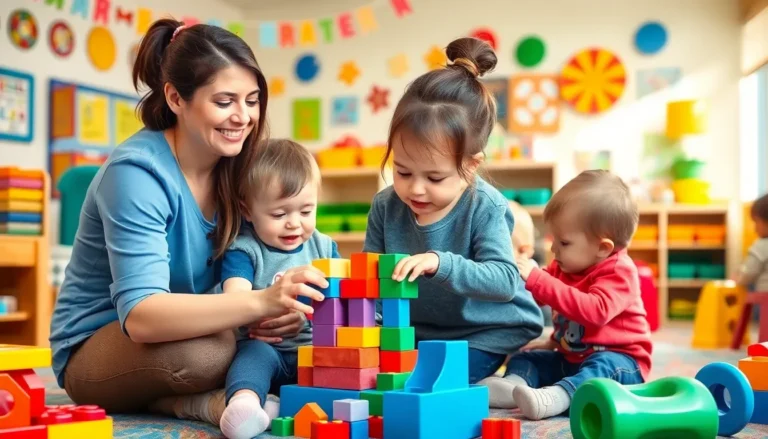In a world where juggling academics, work, and family can feel like a circus act, the University Child Development Center steps in as the ultimate ringmaster. This vibrant oasis isn’t just a daycare; it’s a nurturing environment where little minds expand and creativity flourishes. Parents can breathe easy knowing their children are in a space that champions learning through play and exploration.
Imagine a place where toddlers can channel their inner Picassos while mastering the art of sharing—sounds dreamy, right? With a curriculum designed to spark curiosity and foster social skills, the center transforms everyday moments into extraordinary learning experiences. So why settle for average when your child can thrive in a community that values growth, laughter, and a sprinkle of mischief?
Table of Contents
ToggleOverview of University Child Development Centers
University Child Development Centers create supportive environments for early childhood growth. They provide parents with essential resources that help balance work and family responsibilities. These centers offer more than simple daycare; they nurture children’s development through engaging experiences.
Learning occurs through play and creativity, encouraging children to explore their interests. The curriculum emphasizes skills such as curiosity and socialization. Engaging activities transform everyday moments into valuable learning experiences. Opportunities for children to interact with peers promote emotional and social growth.
Each center typically includes trained educators who understand child development principles. They focus on fostering a love for learning that lasts a lifetime. In addition, many centers advocate for a community atmosphere that values joy and growth among children.
Programs often integrate educational initiatives that align with developmental milestones. This alignment ensures that children acquire critical skills as they grow. Facilities frequently prioritize safety, nurturing, and inclusive practices to support every child’s needs.
Families can expect regular communication, keeping them informed about their child’s progress. Flexibility in programming allows for adjustments based on individual family schedules and needs. Through these efforts, University Child Development Centers play a crucial role in shaping the early educational landscape for young children.
Educational Philosophy

The University Child Development Center emphasizes a holistic approach to education. This philosophy nurtures the growth of children by addressing their cognitive, emotional, and social needs.
Importance of Child Development
Child development plays a crucial role in shaping a child’s future. Early experiences influence brain development and learning capabilities, setting the foundation for academic success. Research indicates that investing in child development significantly enhances lifelong learning and emotional well-being. Centers that focus on this early development create opportunities for critical skill acquisition and social interaction. Families gain essential resources for nurturing their children’s growth, establishing a solid support system for different stages of development.
Approach to Learning
The approach to learning at the center prioritizes active engagement and exploration. Children engage with hands-on activities that stimulate curiosity, enhancing their understanding of the world. Educators encourage interaction with peers, fostering cooperation and communication skills. Play-based learning forms a foundation for lessons, merging fun with educational objectives. This method aligns with developmental milestones to ensure growth in essential areas like problem-solving and emotional regulation. Flexibility in programming allows for individualized learning paths, meeting the unique needs of each child.
Programs Offered
The University Child Development Center provides various programs catering to children’s unique developmental needs. Each program focuses on fostering growth through engaging curriculum and supportive environments.
Age Groups Served
The center serves children aged six weeks to five years. Infants receive care and stimulation through sensory activities. Toddlers engage in play-based learning that promotes language acquisition and social skills. Preschoolers participate in structured activities designed to prepare them for kindergarten. Each age group benefits from tailored experiences, ensuring age-appropriate developmental milestones are met.
Curriculum Highlights
Curriculum focuses on holistic development across cognitive, emotional, and social domains. Daily activities include art projects, storytelling, and outdoor play that spark creativity and curiosity. Literacy and math concepts are introduced through hands-on experiences, making learning enjoyable. Educators integrate themes that resonate with children’s interests, allowing for deeper engagement. Regular assessments ensure alignment with developmental goals, supporting continuous growth and learning.
Staff Qualifications
Qualified staff members play a significant role in the University Child Development Center’s success. Their training and experience equip them to foster a nurturing and educational environment.
Training and Experience
Educators undergo extensive training focused on early childhood development principles. Specific programs emphasize hands-on activities that build cognitive, emotional, and social skills. Many teachers hold degrees in early childhood education or related fields, ensuring a solid foundation in child growth and learning. Additional professional development opportunities keep the staff updated on best practices and new research in the field. Through this ongoing education, staff maximize their ability to support each child’s unique journey.
Teacher-Child Ratios
Optimal teacher-child ratios promote individualized attention and enhance learning experiences. The center maintains a low ratio, typically one teacher for every three infants and one teacher for every five toddlers. This structure allows educators to engage meaningfully with each child, facilitating emotional security and supporting developmental milestones. Small group sizes not only foster closer relationships between teachers and children but also enable tailored activities that cater to diverse learning styles and needs. This focused approach ensures that all children receive the guidance necessary for positive growth.
Facilities and Resources
The University Child Development Center prides itself on providing state-of-the-art facilities and resources that support the development of every child. Each area is designed to enhance learning through exploration and engagement.
Indoor Learning Environment
Inside the center, classrooms feature age-appropriate materials that stimulate creativity and curiosity. Designed with open spaces, areas facilitate movement and interaction among children. Resources include books, educational toys, and art supplies, each promoting cognitive development and social skills. Natural light fills the rooms, creating a warm atmosphere that encourages exploration. Educators utilize a variety of teaching aids, from interactive displays to hands-on activities. Children enjoy a dynamic learning experience that aligns with developmental milestones.
Outdoor Play Areas
Outdoor spaces offer children opportunities for physical activity and imaginative play. Equipped with safe and age-appropriate structures, play areas promote gross motor skills and social interaction. Climbers, swings, and slides invite active participation, while gardens allow children to explore nature. Educators supervise play, ensuring safety and fostering cooperative games. Activities in these spaces support not only physical development but also emotional well-being. Regularly scheduled outdoor time enhances children’s enjoyment of learning through play.
Parent Involvement
Parent involvement plays a crucial role in the success of the University Child Development Center. It creates a partnership between families and educators, enhancing the overall learning experience for children.
Communication with Families
Regular communication with families ensures they stay informed about their child’s growth. Newsletters and progress reports highlight achievements and developmental milestones. Parent-teacher conferences provide opportunities for discussing individual goals and progress. Educators encourage open dialogue, fostering a supportive atmosphere for parents. This transparency builds trust, allowing families to engage meaningfully in their child’s education. Overall, consistent updates empower parents to contribute to enhancing their child’s learning journey.
Opportunities for Engagement
The center offers various opportunities for family engagement throughout the year. Events such as family workshops and open houses promote connection between parents and educators. Involving families in classroom activities encourages participation in their child’s educational experiences. Volunteers can assist in organizing events, fostering a sense of community among families. This involvement strengthens relationships and contributes to children’s emotional development. Creating spaces for parents to share ideas and feedback enriches the center’s programming and enhances child development.
Conclusion
The University Child Development Center stands as a beacon of support for families navigating early childhood education. Its commitment to fostering a nurturing environment ensures that children not only learn but thrive through play and exploration. By prioritizing individualized attention and holistic development, the center equips young learners with essential skills that lay the foundation for future success.
With a focus on community involvement and open communication, parents are actively engaged in their child’s journey. This partnership enhances the overall experience for children and families alike. The University Child Development Center truly exemplifies the importance of quality early education in shaping well-rounded individuals ready to embrace the world.



